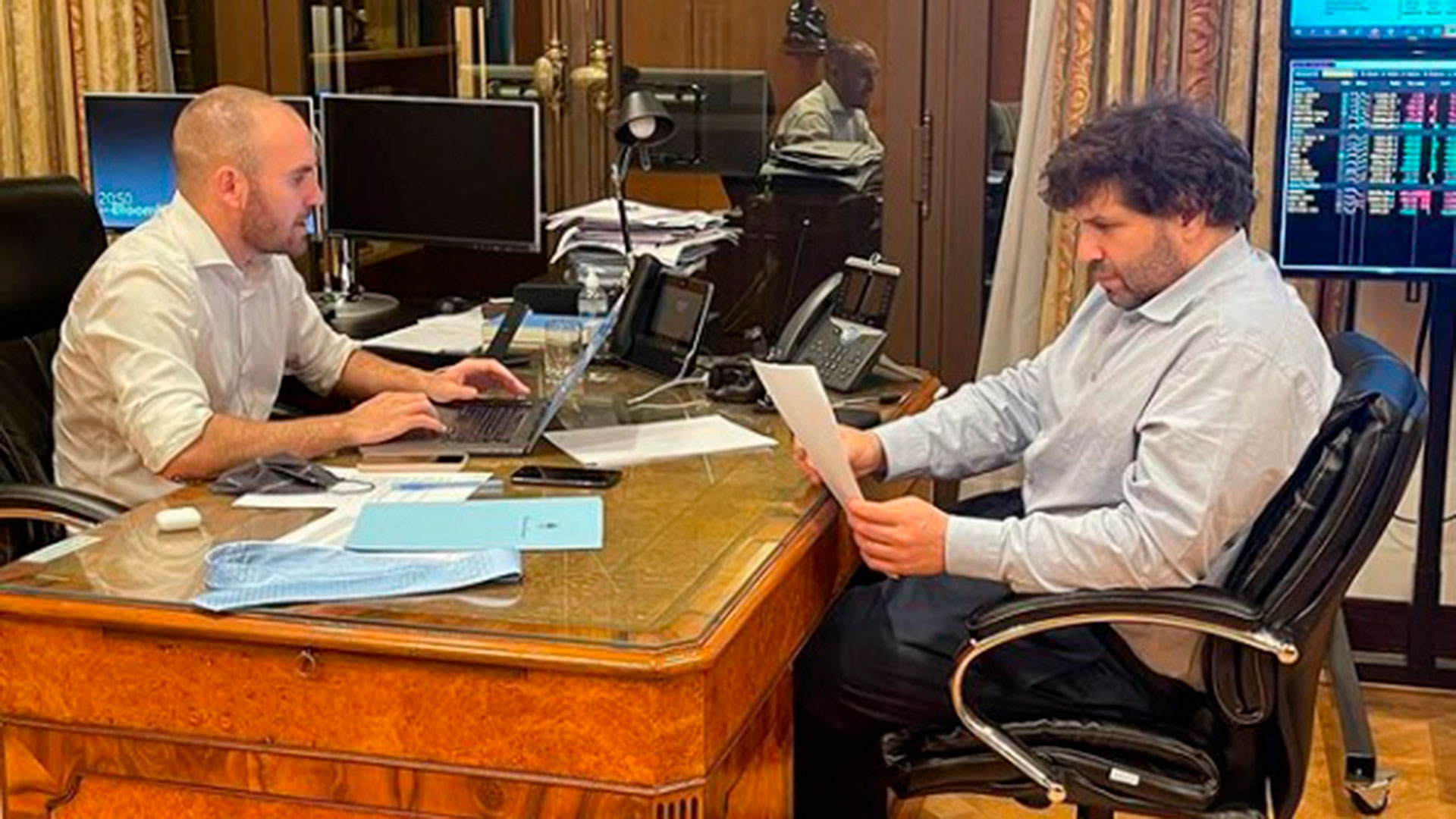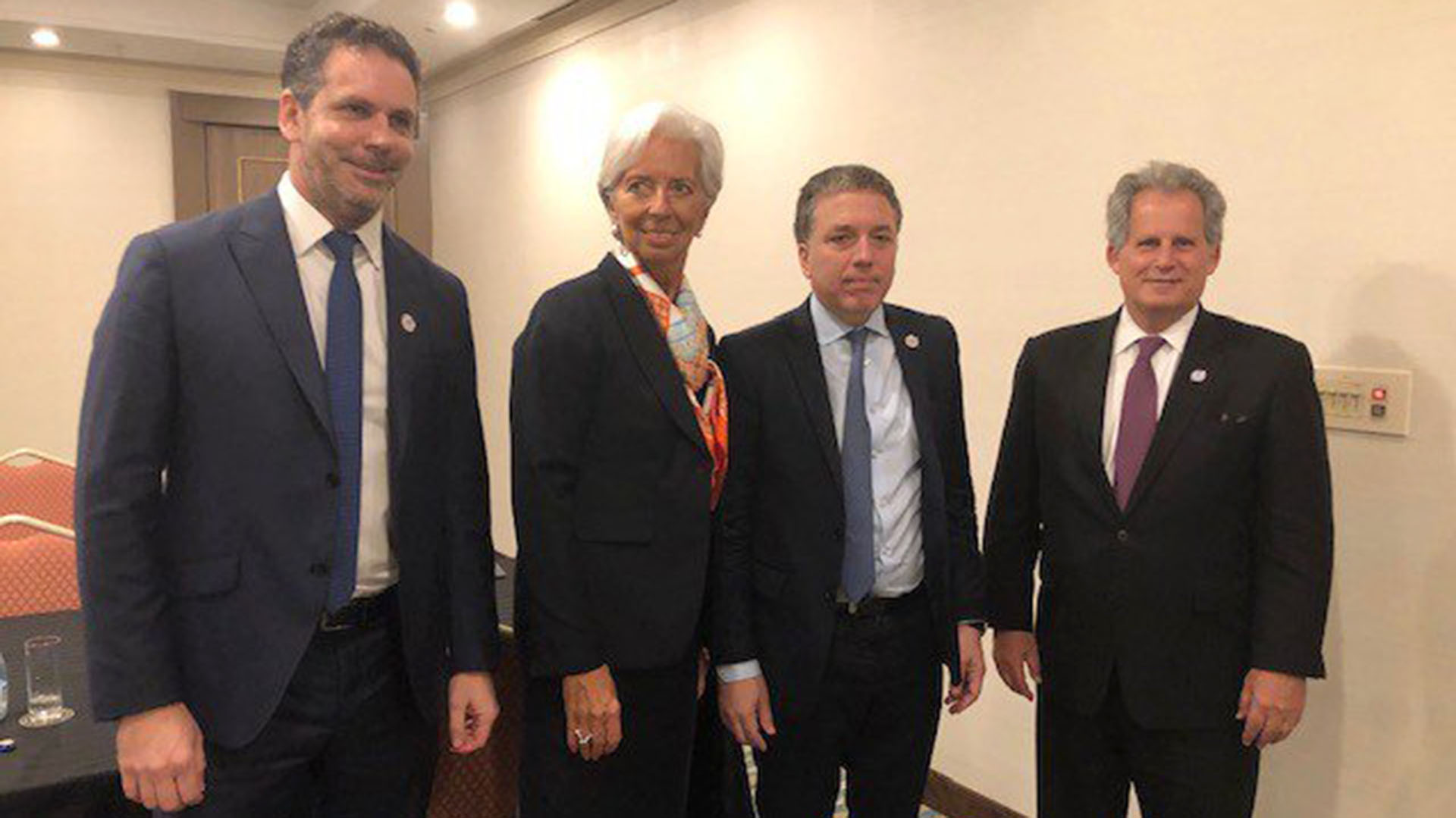
The board of the International Monetary Fund (IMF) will discuss Argentina's new program when the debt law is passed in the Senate, in a session that will highlight the strong political and economic risks facing the country.
The meeting will take place in the modernized room on the 12th floor of the Fund building - which no longer has the paintings of Kristalina Georgieva's predecessors - and it remains to be known whether, like the rest of the organization's activities, it takes place in hybrid form, with some directors in Washington and others in virtual form.
Official sources told Infobae in Buenos Aires that the board led by Georgieva is expected to meet “imminently” after the Upper House finishes approving the text that has already been validated as deputies. In Washington, they confirmed that the board can - and has already done so in the past - meet with a very short notice period.
It should be recalled that the country faces maturities of 949 million on Monday 21 and 1,832 million on Tuesday 22 with the IMF and that the official intention is to avoid such payments with express approval of the 10-year refinancing program to pay the USD 40 billion of the credit contracted during the Mauricio Macri government. Will the meeting be before Tuesday? There is no data yet on this: perhaps tomorrow the Fund's spokesperson, Gerry Rice, will give some details about it. If the meeting is indeed days after the local approval and expiration, the Fund would not count that delinquency as such (provided that at the end of the tour the board ends up approving the program).
Two sources in Washington indicated that convening board meetings to bless a new program should usually be done 2 weeks in advance, but they clarified that there are exceptions for cases of “urgency” and in the Hacienda Palace they expect this to be the case. To monitor these contingencies, the Argentine representative to the multilateral organization, Sergio Chodos, returned to the US capital.

And, despite internal objections, the possibility that the anti-IMF stance within the government will prevail until the end of 2023 — personalized in the sector that Cristina Kirchner responds to — will be a determining factor for the board to approve the agreement, beyond the qualms that exist among some of the staff and among some directors.
“If the government made the effort that no one asked it to vote on the agreement in Congress, after the board of directors it cannot leave it aside, because that would strengthen the vice president's position,” a source from Washington told Infobae.
“There are five revisions until the end of Alberto Fernández's term, such as eventually the program falling down later if the government does not comply, but the bomb should not be dropped now from Washington,” he said.
All these discussions within the IMF will take place until the agreement reaches the board room; then, it was said, “it should be a formality.” There was only one case of an African country plagued by allegations of corruption that had to be reviewed more than once by the staff before being approved by the board.
In any case, all this internal debate will be reflected in the “Risk Assessment” report, which was also carried out when the country received the previous extraordinary credit from the Fund in 2018, will focus on the weaknesses of the local scenario — in technical and institutional matters — and the challenges for the multilateral organization.
This “Assessment of the Risk s” will surely place the emphasis on high inflation, the country's low growth capacity and the poor development of the local capital market, among other aspects.
In political terms, the “challenges” that the ruling coalition will face in meeting the program's goals will be discussed in the most elegant way.

It is hoped that the debate, which will surely end with the blessing of the board of directors led by Georgieva, will be attended by the 24 directors who hold a chair representing all of the Fund's partner countries.
“The board meeting will surely be lengthy, with several questions to the staff to see what can happen with the new program and the team will explain the economic and political risks to the country and to the IMF; it may take a few days beyond the day of next Tuesday's expiration,” the former representative told Infobae Argentine before the organization, Gabriel Lopetegui.
Meanwhile, Hector Torres, who played the same role, said that “risk assessment seeks to detect the vulnerabilities and macroeconomic risks that a country faces in the short term.”
“The war in Europe generates great uncertainty that makes it very difficult to estimate these risks. In our case, this uncertainty is enhanced by the obvious fracture of the ruling coalition and the lack of opposition support for the agreement negotiated with the Fund's staff.”
“I think this could have been avoided if, before sitting down to negotiate, we had sought to agree on the guidelines of an economic program drawn up by the Government. It is understandable that legislators should be wary if they are asked to approve urgently and on a closed book an agreement that they did not know and that they cannot modify,” he concluded.
The antecedent of 2018:
In 2018, with the approval of the first exceptional access credit, there was also a risk report. It was indicated that the country was a “historical and strong user of the Fund's resources until the mid-2000s; it had been among the top five borrowers for most of the 1980s and 1990s.”
After listing the programs signed in recent decades and the cancellation of debt in 2006, the increase in registered and unregistered sovereigns in the new century was recalled.
“During the period 2007-15, the ratio of public debt to GDP averaged almost 47.5 percent. Reflecting the increased gross financing needs since 2016, public debt increased to almost 57 percent of GDP by the end of 2017,” he said.
Regarding the risks to the Fund of the program taken in 2018, he warned when approving it that it would be “the largest agreement in absolute terms in the history of the Fund, excluding agreements under the Flexible Credit Line (FCL).”
“The proposed SBA agreement would have a significant impact on the Fund's liquidity and its exposure to credit risk,” it was warned, before approving the second program, which deepened this position.
Given this picture, IMF adopted the “pragmatic and realistic” approach mentioned by its managers to approve the agreement with the Government, even with the recognition that it does not have a solid plan or adequate reform programme to ensure debt repayment in the medium term.
In 2018, the director for Russia was the one who raised his voice to protest that the program with Argentina was not “realistic or achievable”, although he later joined his peers and voted in favor. That official, Aleksei Mozhin, until now served as “dean of the board” until he was displaced by Moscow's invasion of Ukraine and now fervently supports the new Argentine program.
KEEP READING:
Últimas Noticias
Debanhi Escobar: they secured the motel where she was found lifeless in a cistern
Members of the Specialized Prosecutor's Office in Nuevo León secured the Nueva Castilla Motel as part of the investigations into the case

The oldest person in the world died at the age of 119
Kane Tanaka lived in Japan. She was born six months earlier than George Orwell, the same year that the Wright brothers first flew, and Marie Curie became the first woman to win a Nobel Prize

Macabre find in CDMX: they left a body bagged and tied in a taxi
The body was left in the back seats of the car. It was covered with black bags and tied with industrial tape
The eagles of America will face Manchester City in a duel of legends. Here are the details
The top Mexican football champion will play a match with Pep Guardiola's squad in the Lone Star Cup

Why is it good to bring dogs out to know the world when they are puppies
A so-called protection against the spread of diseases threatens the integral development of dogs




